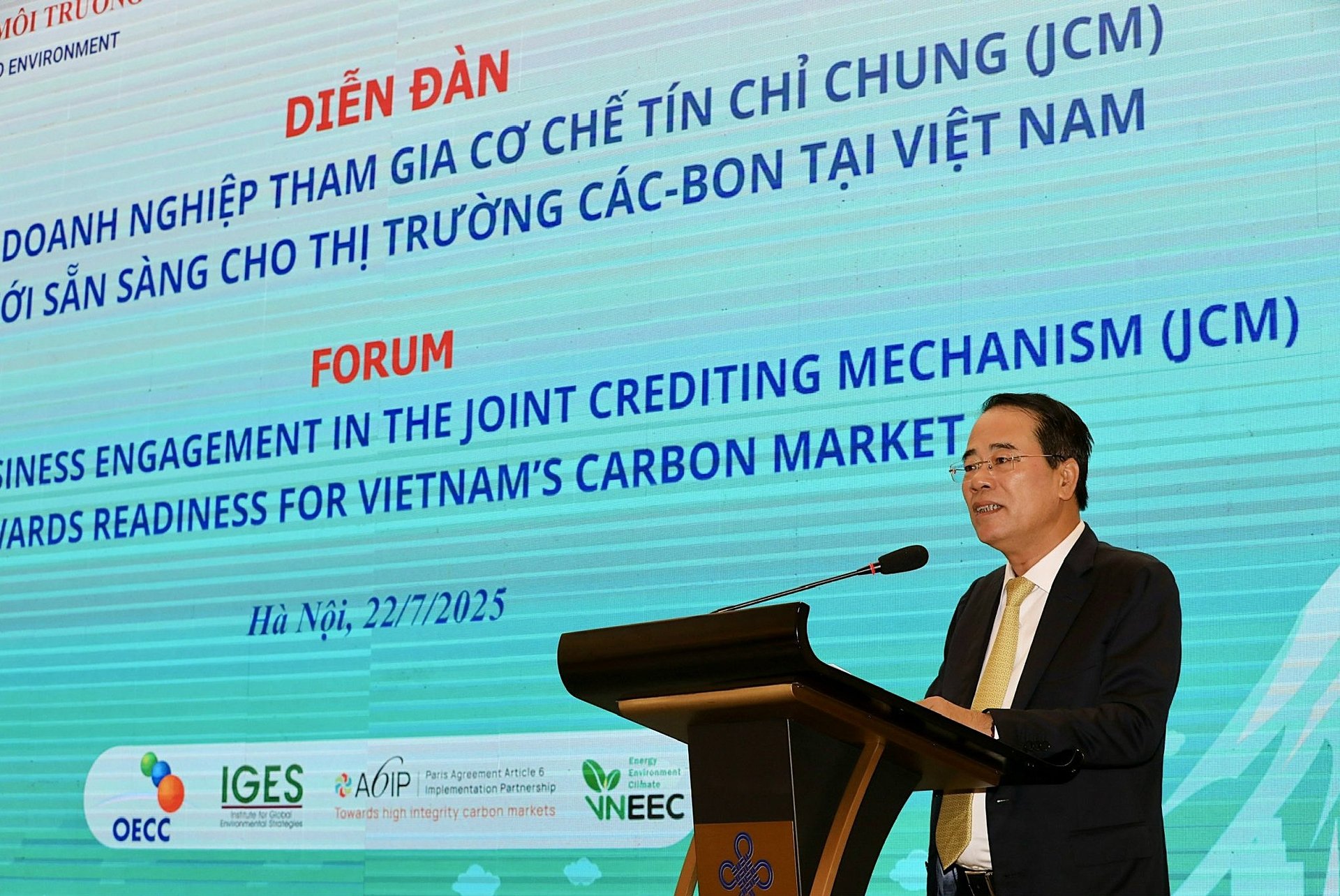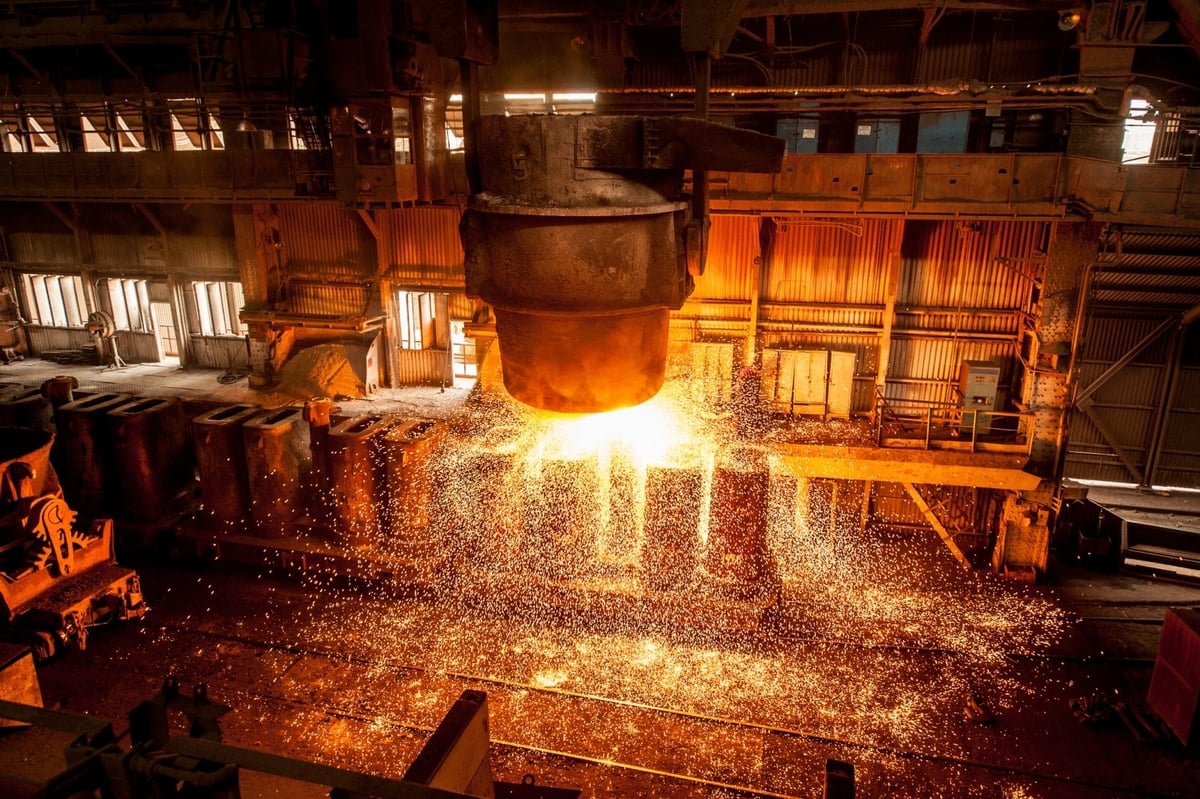November 19, 2025 | 05:52 GMT +7
November 19, 2025 | 05:52 GMT +7
Hotline: 0913.378.918
November 19, 2025 | 05:52 GMT +7
Hotline: 0913.378.918
On July 22, Vietnam’s Ministry of Agriculture and Environment, in collaboration with Japan’s Ministry of the Environment, organized the forum "Promoting Business Engagement in the Joint Crediting Mechanism (JCM) Towards Readiness for Vietnam's Carbon Market."
The public-private forum introduced Vietnam’s current regulations on establishing a carbon exchange, principles and experiences in developing methodologies for generating carbon credits under the JCM in potential sectors, as well as updates on the implementation of projects within the Vietnam - Japan cooperation framework.
As Vietnam strives to fulfill its greenhouse gas emissions reduction commitments under the Paris Agreement, developing a domestic carbon market has become a government priority, with concrete institutional and legal steps underway.
According to Mr. Tang The Cuong, Director General of the Department of Climate Change, Vietnam is actively preparing the necessary conditions for launching its carbon market, including a legal framework, technical infrastructure, technology, human resources, and financial capacity. Most recently, the Government issued Decree No. 119/2025/ND-CP, amending and supplementing several articles of Decree No. 06/2022/ND-CP dated January 7, 2022, which regulates greenhouse gas emissions reduction and ozone layer protection.

Mr. Tang The Cuong, Director General of the Department of Climate Change, delivered the opening remarks and chaired the forum. Photo: KC.
In addition, another key decree related to the monitoring, verification, and trading of carbon credits, led by the Ministry of Finance in coordination with the Ministry of Agriculture and Environment, is being prepared for submission to the Government for consideration. Once issued, this document will serve as a crucial legal foundation for Vietnam’s carbon market to officially operate by the end of 2025.
The Joint Crediting Mechanism (JCM), an initiative launched by the Governments of Japan and Vietnam, has been part of this bilateral cooperation framework since 2013. To date, the JCM has expanded to 30 countries, with 256 projects implemented. Vietnam has approved 15 projects with Japan and issued approximately 35,000 carbon credits.
"During the 2021 - 2030 period of JCM cooperation, Vietnam is obligated to reduce greenhouse gas emissions under its Nationally Determined Contribution (NDC). Therefore, the mechanism is not only a form of bilateral cooperation but also a tool to help Vietnam achieve its national climate goals effectively and transparently," said the leader of the Department of Climate Change.
Mr. Matsuzawa Yutaka, former Deputy Minister of the Environment and current Advisor to the Japanese Minister of the Environment, commented: "Both Vietnam and Japan are in the process of developing their domestic and international carbon markets. With strong demand from businesses, a significant supply of credits from cooperative projects, and a gradually improving legal framework, the two countries are well-positioned to scale up and operate a carbon credit market."
According to Director General Tang The Cuong, JCM projects between Vietnam and Japan are currently focused on clean and low-emission technology transfer, supporting Vietnam’s green transition and its goal of achieving carbon neutrality by 2050. "These are multi-purpose projects not only aimed at achieving Net Zero but also at transferring advanced technologies for emissions reduction," he emphasized.
Japan is now proposing to expand financial investments into low-emission sectors such as agriculture, green transportation, forestry, and carbon capture, utilization and storage (CCUS).
Mr. Iio Satoru, Director General of the Global Environment Bureau (Ministry of the Environment, Japan), stated: "The Japanese Government is working closely with Vietnam to reduce greenhouse gas emissions through the JCM. The carbon credits generated from these projects not only help lower the cost of green energy but also enhance the economic value of Vietnam’s supply chains."

Steel industry is one of the first sectors to join Vietnam's carbon market. Photo: iStock.
According to Mr. Satoru, two key factors are essential for scaling up JCM projects. First, a legal framework and implementation procedures in Vietnam must be developed, in addition to improving the bilateral cooperation mechanism. Moreover, JCM regulations and guidelines must be aligned with Article 6 of the Paris Agreement.
Another crucial factor is promoting investment flows into four potential sectors: agriculture, forestry, energy transition, and carbon capture and storage technology, which Japanese enterprises have already successfully implemented in Vietnam.
To support this process, the Government of Japan has established a new agency called the JCM Agency (JCMA) as of April 2025. The entire process, from project development to carbon credit issuance, will be streamlined for partner countries, including Vietnam.
"The development and implementation of JCM projects have always involved close coordination between both sides. This represents a model of bilateral cooperation between Vietnam and Japan in their shared journey toward sustainable development and emissions reduction," reaffirmed Mr. Matsuzawa Yutaka, former Deputy Minister of the Environment of Japan.
Translated by Kieu Chi

(VAN) 'If we can address disease challenges and properly plan farming zones, Vietnamese shrimp can absolutely rise to lead the world,' Mr. Le Van Quang affirmed.

(VAN) The year 2025 continues to mark a significant footprint for Chanh Thu Fruit Import-Export Group Joint Stock Company (Chanh Thu Group) in the international market.

(VAN) Participating in the exhibition celebrating the 80-year tradition of the Agriculture and Environment sector, Dong Giao Food Export Joint Stock Company (DOVECO) showcased a range of products utilizing new technologies.

(VAN) Vietnam’s pepper export turnover in the first 10 months of 2025 reached $1.39 billion, already surpassing the full-year figure of 2024.

(VAN) AGRITECHNICA 2025 has impressively reaffirmed its position as the world’s leading trade fair for agricultural machinery.
/2025/11/17/4947-2-104601_225.jpg)
(VAN) The international market is growing rapidly, creating major opportunities for Viet Nam's tilapia industry.
/2025/11/17/1234-2-010716_981.jpg)
(VAN) Deputy General Director of Viet Nhat Group Nguyen Dang Ngoc shared experiences on building linkage chains and developing sustainable tilapia farming that meets international standards.